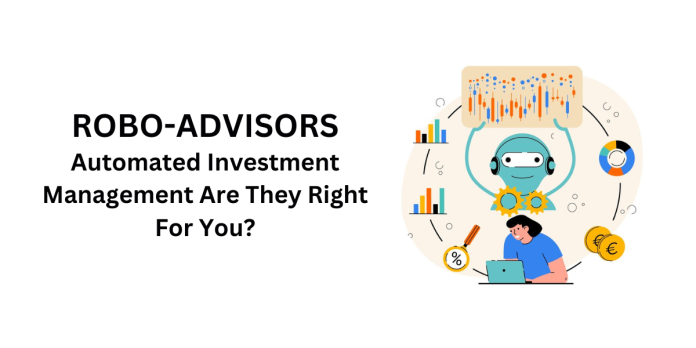In today’s digital age, robo-advisors have emerged as a popular tool for managing investments. These automated platforms provide algorithm-driven financial planning services with minimal human intervention, often at lower costs than traditional financial advisors. But are robo-advisors right for everyone? Let’s delve into the pros and cons to help you make an informed decision.
Understanding Robo-Advisors
Robo-advisors leverage Modern Portfolio Theory (MPT) to optimize investment strategies. They gather information about your financial situation and goals through online questionnaires and use this data to recommend and automatically manage your investments. This hands-off approach appeals to many, but it’s crucial to understand both the advantages and limitations before diving in.
Advantages of Robo-Advisors
- Cost-Effectiveness: Robo-advisors typically charge lower fees than traditional advisors, often under 0.5% of assets under management (AUM) compared to 1-2% for human advisors. This makes them more accessible to a wider range of investors, particularly those starting with smaller portfolios.
- Accessibility and Convenience: Robo-advisors are available 24/7, allowing you to manage your investments anytime, anywhere. Their user-friendly interfaces make them easy to navigate, even for beginners.
- Diversification: Robo-advisors automatically diversify your portfolio across various asset classes based on your risk tolerance and goals. This helps spread risk and potentially boost returns.
- Low Minimum Investment: Many robo-advisors require minimal initial investments, making them suitable for those starting their investment journey.
Drawbacks of Robo-Advisors
- Lack of Personal Touch: While robo-advisors offer automated advice, they lack the personalized approach of a human advisor. They may not be able to fully understand your unique financial circumstances and goals, potentially leading to suboptimal recommendations.
- Limited Services: Robo-advisors excel in basic investment management but may fall short when it comes to complex financial planning needs like estate planning, tax strategies, or intricate investment decisions.
- Limited Human Interaction: Some investors may miss the human interaction and emotional support that a traditional advisor can provide, especially during periods of market volatility.
- Technology Dependence: Robo-advisors rely heavily on technology, and any technical glitches or outages could disrupt your access to your investments or financial advice.
Who Should Consider a Robo-Advisor?
Robo-advisors can be a great fit for:
- New Investors: Those starting their investment journey with limited capital and seeking a straightforward, automated approach can benefit from the affordability and convenience of robo-advisors.
- Cost-Conscious Investors: Individuals prioritizing low fees and appreciating the transparency of robo-advisor pricing models might find them appealing.
- DIY Investors: If you’re comfortable with managing your finances independently and have a well-defined investment strategy, a robo-advisor can execute your plan efficiently.
Who Might Be Better Off with a Human Advisor?
If you fall into any of the following categories, consider seeking a human advisor:
- Complex Financial Needs: Individuals with intricate financial situations like inheritance planning, tax optimisation, or business ownership might require the personalized guidance of a human advisor.
- High-Net-Worth Individuals: Wealthier investors with complex portfolios and diverse investment goals may benefit from the expertise and tailored advice of a human advisor.
- Need for Emotional Support: If you value human interaction and reassurance during market fluctuations or require emotional support alongside financial guidance, a human advisor can provide that personal touch.
Conclusion
Robo-advisors offer a convenient, low-cost, and automated approach to investment management, making them suitable for many investors. However, they lack the personalized touch and may not be ideal for everyone. Carefully consider your individual needs, risk tolerance, and financial goals before deciding whether a robo-advisor or a human advisor is the right fit for you. Remember, there’s no one-size-fits-all solution, and the best approach depends on your unique circumstances. The decision to use robo-advisors hinges on a balance of factors including cost, convenience, and the complexity of one’s financial situation.
Disclaimer:This blog has been written exclusively for educational purposes. The securities mentioned are only examples and not recommendations. It is based on several secondary sources on the internet and is subject to changes. Please consult an expert before making related decisions.


